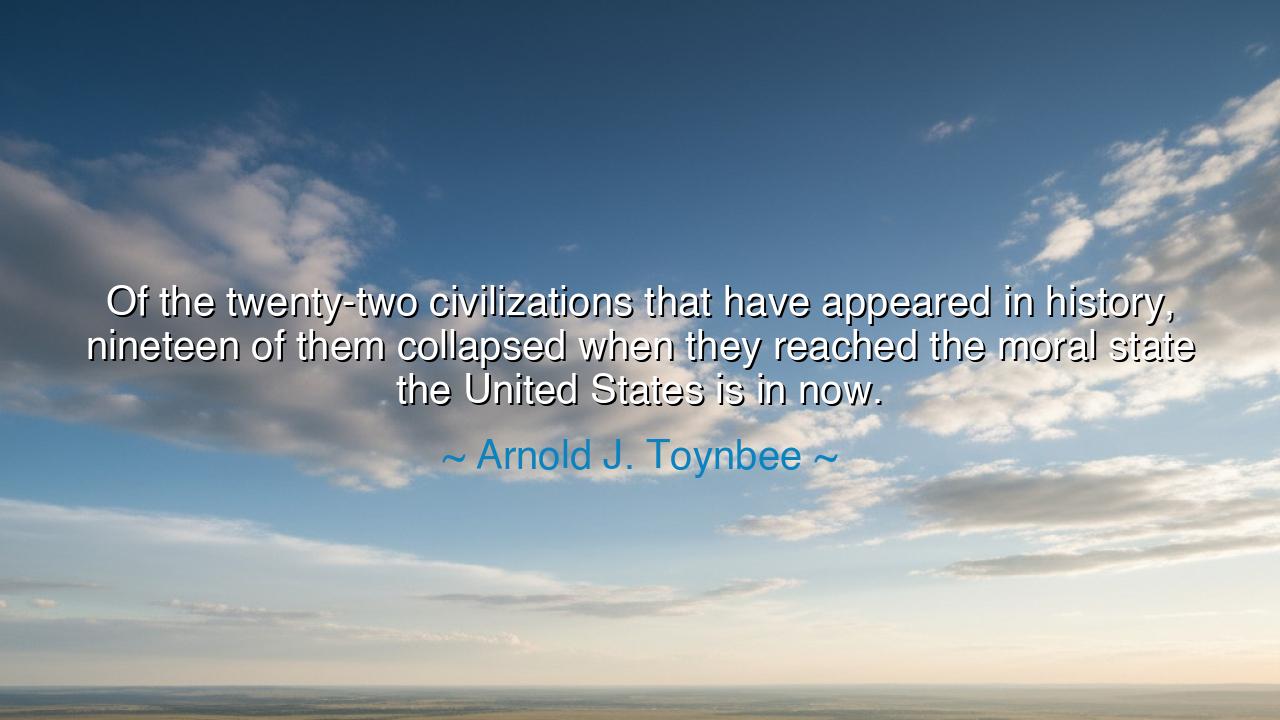
Of the twenty-two civilizations that have appeared in history
Of the twenty-two civilizations that have appeared in history, nineteen of them collapsed when they reached the moral state the United States is in now.






In the solemn and prophetic voice of Arnold J. Toynbee, the great historian and philosopher of civilization, we hear a warning carved from the granite of history itself: “Of the twenty-two civilizations that have appeared in history, nineteen of them collapsed when they reached the moral state the United States is in now.” These words are not the cry of a cynic, but the lament of a sage who had gazed into the long river of time and seen the pattern of rise and fall, creation and decay. Toynbee, who devoted his life to studying the life cycles of civilizations, spoke not only of America, but of the universal destiny that awaits any people who forget the virtues that made them great. His voice is both judgment and counsel—a reminder that moral decline, not foreign conquest, is the truest destroyer of empires.
Toynbee’s insight was born from a lifetime of study. Across his monumental work, A Study of History, he examined how societies grow not by force of arms or wealth of treasure, but through their moral and spiritual vitality. Civilizations, he observed, are not murdered—they commit suicide. They perish when they lose their sense of purpose, when comfort replaces courage, when cynicism drowns faith, and when the pursuit of pleasure eclipses the pursuit of virtue. Thus, his warning about the United States was not an insult but an echo of a timeless law: that power without morality decays from within, and that no nation, however mighty, is immune to the laws that govern the human spirit.
Consider the ancient Roman Empire, whose splendor once stretched from the cold cliffs of Britain to the sands of Arabia. Rome, too, believed itself eternal. Yet when its citizens ceased to honor duty, when wealth became worship and entertainment replaced honor, the rot began. Gladiatorial games distracted the populace, corruption infected the Senate, and the empire’s moral spine broke long before its armies fell. Toynbee saw in modern America a reflection of that same peril: a people rich in material triumph, yet impoverished in spiritual discipline. He saw the rise of self-indulgence, the erosion of family and faith, the loss of shared ideals—and he knew that such conditions had doomed civilizations before.
This is the essence of Toynbee’s prophecy: moral decline precedes collapse. The fall of Greece after its golden age, the decay of Byzantium, the ruin of the Persian Empire—all followed the same pattern. Strength turned to arrogance, freedom to license, unity to division. The people forgot that civilization is not sustained by laws alone, but by the unseen cords of conscience. The temple of a nation does not crumble from the outside until its pillars of virtue have rotted within. Toynbee understood this with the clarity of one who had walked through the ruins of the past and seen the dust of empires blown by the same unchanging wind.
Yet there is, in his warning, not only despair but hope. For if moral decay brings collapse, then moral renewal can bring revival. Toynbee did not believe civilizations were doomed to die; he believed they were tested. In every age, he wrote, there arises a creative minority—men and women of vision and integrity who rekindle the flame of purpose. It was such men who revived Greece after its wars, who guided Europe from the darkness of the Middle Ages into the light of the Renaissance. So too, he implied, could America—and every nation—save itself, if it turned again toward truth, sacrifice, and moral courage.
The ancient story of Cincinnatus, the Roman farmer called from his plow to save the Republic, stands as a symbol of this virtue. When victory was won, he refused power and returned to his fields. In him, the Romans once saw their ideal: a man who valued duty above glory, service above gain. But when men like him vanished, Rome’s soul vanished too. Toynbee’s warning invites every citizen to become such a guardian—to live with integrity, to lead by example, and to resist the soft corruption of apathy and greed. Civilization, he reminds us, is built not by governments, but by the character of its people.
The lesson is clear: the fate of nations rests upon the moral strength of individuals. Each generation must renew the covenant of virtue, lest the light of its civilization be extinguished by its own neglect. Do not wait for leaders to save the world; save it in your own heart first. Speak truth when lies are easy. Work honestly when deceit is rewarded. Cherish wisdom over wealth, and discipline over comfort. These are the stones from which every enduring civilization is built.
And so, my child, remember the teaching of Toynbee as one remembers the whisper of the ancients: no empire falls by the sword until it has first fallen in spirit. Guard your nation’s heart as you would your own. For when a people lose their moral compass, they drift into ruin; but when they turn again to virtue, the soul of their civilization rises anew, bright and unbroken, against the gathering dusk of history.






AAdministratorAdministrator
Welcome, honored guests. Please leave a comment, we will respond soon